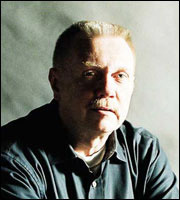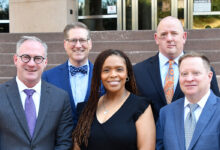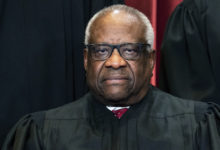Supporting the option, if not the concept.
In late August, I stood in the checkout lane of my local supermarket, transfixed by the cover of the newest People magazine. “Exclusive Photos and Interviews! Ellen and Portia’s Wedding! The rings, the cake, the flowers! All the details from their emotional and intimate at-home ceremony!”
I added the magazine to my purchases on the conveyer belt. The cashier didn’t blink; neither did the young man bagging my groceries. Gay marriage had arrived in Middle America; it was just another magazine sale on that hot August afternoon in Houston.
The right to gay marriage, however, only exists in Massachusetts and California. But if we take careful steps, marriage equality will one day be a reality in the United States.
Gay marriage is still a new item on my homosexual agenda. When I came out in 1970, I thought the idea was ludicrous. In my opinion, heterosexuals had already set a shabby example and I saw no reason for gays to follow suit. In 1970, survival was all-important; choosing our rights as citizens wasn’t much of an option.
Back in those days, I enjoyed gay commitment ceremonies I witnessed now and then, usually in someone’s living room, attended only by a small group of friends. I thought these events reflected real romance as opposed to the increasingly showy but hollow heterosexual nuptials.
Despite their lack of depth, I still love the splendor of straight weddings. When The Sound of Music was released on VHS, I rewound the wedding scene hundreds of times, always exhilarated by that billowing pipe organ and the angelic choir of nuns. My daily planners during the 1980s contained large capitalized entries reminding me of the next Dynasty wedding.
Amid all the cultural war battles, it’s important to remember that marriage began as a civil institution, designed to protect the property rights of the rich. Romance wasn’t a necessary part of the equation; the “arranged marriage” survived well into the 20th century, and exists in parts of the world even today.
The involvement of churches is nothing more than religious trappings, added at a time when the church had greater power over the masses than did kings and queens.
Gay marriage is quite simply about the basic rights of human beings, and for this reason, it’s important to win this effort. It’s also a reason why we should stop referring to it as “gay marriage”—a term that separates us, as if we were special cases. We should start calling it “marriage equality”—a term that makes us part of all those who wish to be married.
This hair-splitting of language isn’t mere political correctness. It’s important to note, for example, that the Supreme Court has never ruled that marriage is between a man and a woman. In every important case they’ve ruled on, such as Loving vs. Virginia, which assured the right of interracial marriage, they have stated that marriage is a right between two human beings. No doubt they’ve thought “man and woman,” but they’ve never spelled it out. And that’s why gay legal activists have asked gay couples not to file marriage challenges at the current time: they don’t want the Supreme Court to get gender specific.
So what would make an excellent test case for marriage equality? Perhaps it might not come until 2014. The U.S. Social Security code holds that it takes 10 years of marriage for a surviving partner to receive full spousal benefits upon the death of their partner. Gay marriage became legal in Massachusetts in 2004. And a successful marriage equality appeal might be a Social Security challenge by a surviving partner in Massachusetts who meets the 10-year requirement.
In the meantime, the fancy footwork continues. President Bill Clinton has been criticized for signing into law the 1996 Defense of Marriage Act (DOMA). But signing DOMA helped avert what fundamentalists really wanted: a constitutional amendment that would define marriage by gender.
Most Democratic candidates these days say that they don’t support gay marriage; they know that such cries only support Republican attack ads. However, they don’t support statewide bans on gay marriage, while many Republicans do. John McCain did so in his own state of Arizona in 2006, and he supports Proposition 8 in California, which could end up nullifying Ellen and Portia’s marriage.
When I watched the Vice Presidential debate between Joe Biden and Sarah Palin, this Democratic wisdom was evidenced by the voter meter that CNN displayed, indicating how a group of independent voters was feeling about what was being said. When both Biden and Palin defined marriage as a man and a woman, the pulse spiked high on the chart; these independent voters agreed with their definition. Like it or not, campaigns have to sell themselves to independents to win, and this evidence tells us that some pandering is inevitable.
While the results of the pulse meter are a downer, Barack Obama’s August acceptance speech in Denver was just the opposite. His words rang out: “We may not be in agreement about same-sex marriage, but we must agree that our gay and lesbian brothers and sisters deserve their civil rights.” Eighty thousand supporters jumped to their feet and roared back a thunderous approval.
Not even that pipe organ and choir of nuns ever made me feel as exhilarated as I felt that night.
Brandon Wolf founded the online group Houston Activist Network (Han-Net), which is now LoneStarActivists.











